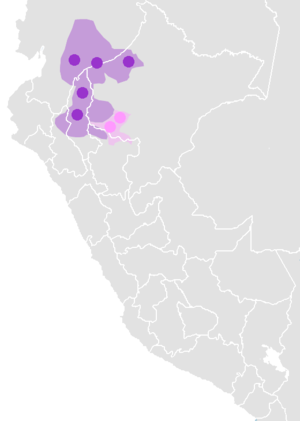Chicham languages
| Chicham | |
|---|---|
| Jibaroan | |
| Geographic distribution | Peru |
| Linguistic classification | Macro-Jibaro ?
|
| Subdivisions | |
| Language codes | |
| Glottolog | jiva1245 |
 Chicham (violet) and Cahuapanan (pink) languages. Spots are documented locations, shadowed areas probable extension in 16th century. | |
The Chicham languages, also known as Jivaroan (Hívaro, Jívaro, Jibaro) is a small language family of northern Peru and eastern Ecuador.
Family division
[edit]Chicham consists of four languages:
- 1. Shuar
- 2. Achuar-Shiwiar
- 3. Awajun
- 4. Huambisa
This language family is spoken in Amazonas, Cajamarca, Loreto, and San Martin, Peru and the Oriente region of Ecuador.
Mason (1950)
[edit]Internal classification of the Chicham languages by Mason (1950):[1]
Jolkesky (2016)
[edit]Internal classification by Jolkesky (2016):[2]
(† = extinct)
Genetic relations
[edit]The extinct Palta language was classified as Chicham by Jacinto Jijón y Caamaño about 1940 and was followed by Čestmír Loukotka. However, only a few words are known, and Kaufman (1994) states that there is "little resemblance".
The most promising external connections are with the Cahuapanan languages and perhaps a few other language isolates in proposals variously called Jívaro-Cahuapana (Hívaro-Kawapánan) (Jorge Suárez and others) or Macro-Jibaro or Macro-Andean (Morris Swadesh and others, with Cahuapanan, Urarina, Puelche, and maybe Huarpe).
The unclassified language Candoshi has also been linked to Chicham, as David Payne (1981) provides reconstructions for Proto-Shuar as well as Proto-Shuar-Candoshi. However, more recently, linguists have searched elsewhere for Candoshi's relatives.
Language contact
[edit]Jolkesky (2016) notes that there are lexical similarities with the Quechuan, Kwaza, Taruma, Yanomami, Katukina-Katawixi, Kandoshi, Tupi, and Arawan language families due to contact. This suggests that Chicham had originated further downstream in the Central Amazon region.[2]
Vocabulary
[edit]Loukotka (1968) lists the following basic vocabulary items for the Chicham languages.[3]
| gloss | Palta | Shuara | Huambisa | Achual | Gualaquiza | Upano | Aguaruna |
|---|---|---|---|---|---|---|---|
| one | chikichik | akítsik | tikichi | shikitiki | tikídyi | ||
| two | xímer | hímer | ximára | himiːra | hima | ||
| three | manéndiuk | kombaːtã | kahvaton | minendu | kampátu | ||
| head | múga | mók | mugwá | múka | mók | ||
| ear | kuísh | kuíshi | kuísh | kweche | kuishi | kuwísh | |
| tooth | nér | náyi | nai | inai | ñái | ||
| man | nuna | aíshmanu | ashmang | aíshmang | ashmano | aishmano | aíshmo |
| water | yuma | yumi | yumi | yumi | yume | yumé | yúmi |
| fire | kapal | xi | hí | xi | hi | hí | |
| sun | atsa | átsa | itsã | ítsa | étsa | itsã | |
| maize | xeme | shaʔa | sha | sha | shaya | sha | |
| house | héa | hía | hía | xéa | yéa | hína |
Proto-language
[edit]Payne's (1981) Proto-Shuar reconstruction is based on data from Shuar, Achuar, Aguaruna, and Huambisa, while his Proto-Shuar-Candoshi reconstruction also integrates data from Candoshi and Shapra.
For reconstructions of Proto-Shuar and Proto-Shuar-Candoshi by Payne (1981), see the corresponding Spanish article.
References
[edit]- ^ Mason, John Alden (1950). "The languages of South America". In Steward, Julian (ed.). Handbook of South American Indians. Vol. 6. Washington, D.C., Government Printing Office: Smithsonian Institution, Bureau of American Ethnology Bulletin 143. pp. 157–317.
- ^ a b Jolkesky, Marcelo Pinho De Valhery. 2016. Estudo arqueo-ecolinguístico das terras tropicais sul-americanas. Ph.D. dissertation, University of Brasília.
- ^ Loukotka, Čestmír (1968). Classification of South American Indian languages. Los Angeles: UCLA Latin American Center.
Bibliography
[edit]- Campbell, Lyle (1997). American Indian languages: The historical linguistics of Native America. New York: Oxford University Press. ISBN 0-19-509427-1.
- Dean, Bartholomew (1990). The State and the Aguaruna: Frontier Expansion in the Upper Amazon, 1541-1990. M.A. thesis in the Anthropology of Social Change and Development, Harvard University.
- Greenberg, Joseph H. (1987). Language in the Americas. Stanford: Stanford University Press.
- Greene, Landon Shane (2004). Paths to a Visionary Politics. PhD dissertation. University of Chicago.
- Kaufman, Terrence (1990). Language history in South America: What we know and how to know more. In D. L. Payne (Ed.), Amazonian linguistics: Studies in lowland South American languages (pp. 13–67). Austin: University of Texas Press. ISBN 0-292-70414-3.
- Kaufman, Terrence (1994). The native languages of South America. In C. Mosley & R. E. Asher (Eds.), Atlas of the world's languages (pp. 46–76). London: Routledge.
- Payne, David L. (1981). "Bosquejo fonológico del Proto-Shuar-Candoshi: evidencias para una relación genética." Revista del Museo Nacional 45. 323-377.
- Solís Fonseca, Gustavo (2003). Lenguas en la amazonía peruana. Lima: edición por demanda.
External links
[edit]- Proel: Familia Jibaroana
- Alain Fabre, 2005, Diccionario etnolingüístico y guía bibliográfica de los pueblos indígenas sudamericanos: JIVARO.[1]
